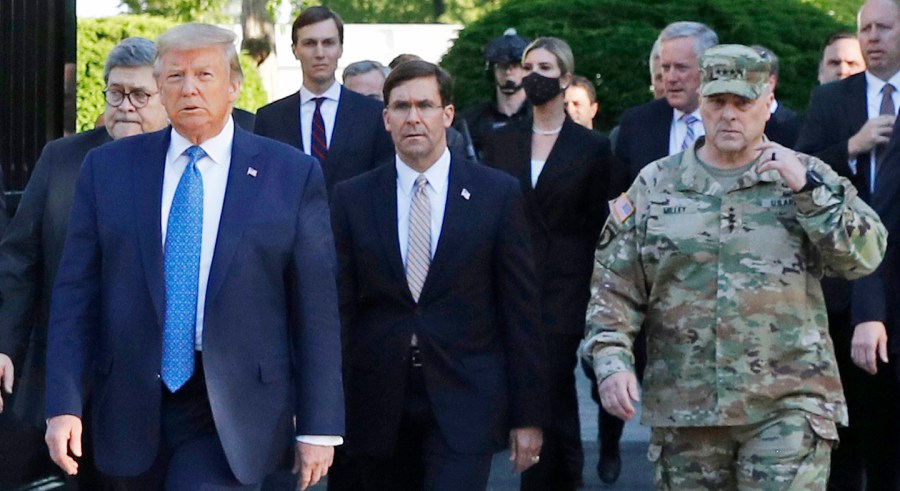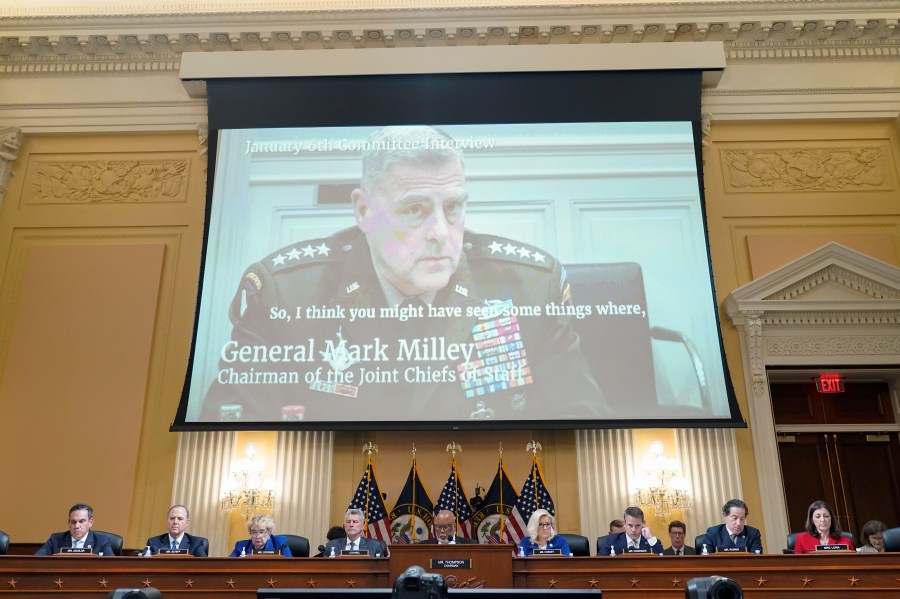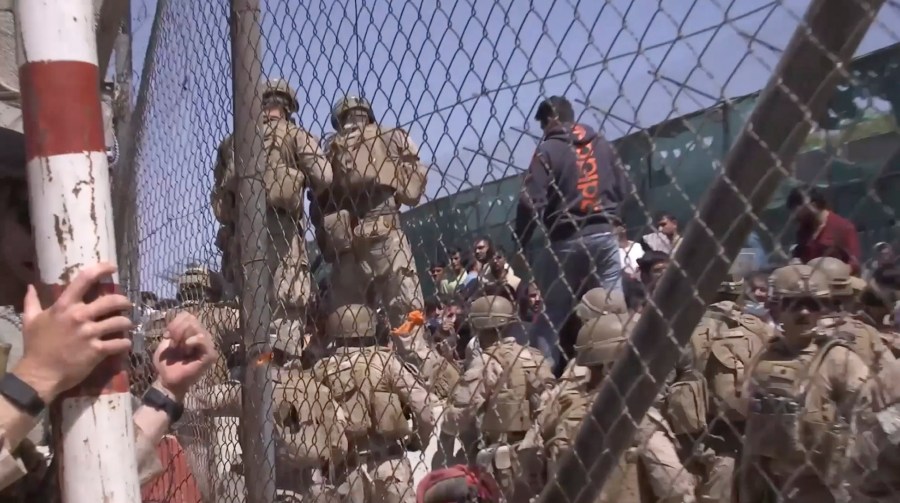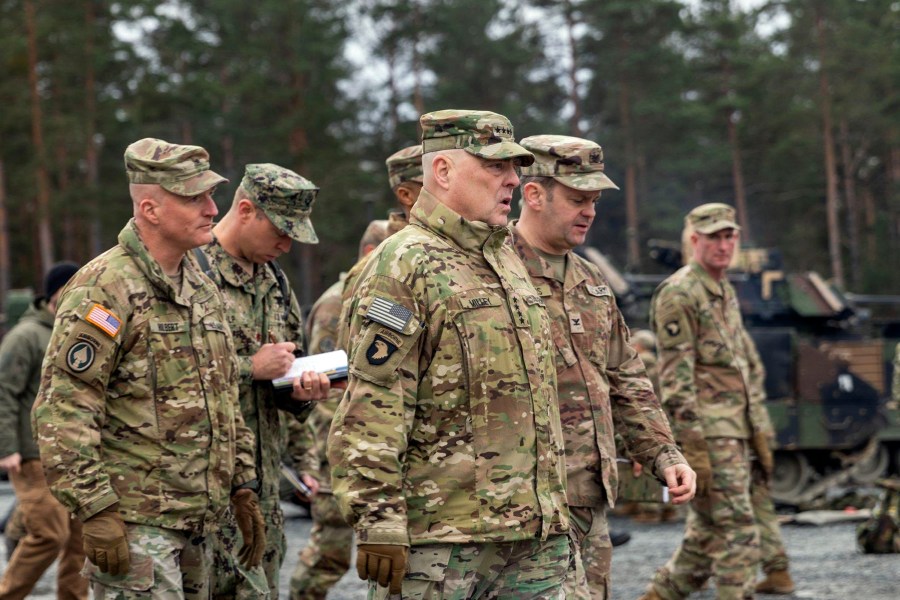Five defining fights in Milley’s tumultuous tenure
Joint Chiefs of Staff Chairman Gen. Mark Milley on Friday will step down as the nation’s highest-ranking military officer after four tumultuous years in American history dissected across two presidencies.
The four-star general — confirmed overwhelmingly by the Senate 89–1 in July 2019 before being sworn in in September — has spent his tenure deftly dodging crises both at home and overseas as well as political pitfalls.
But Milley is also considered one of the most divisive chairmen in recent history. His supporters say he responded accordingly to political animosity and always protected the Constitution. His detractors, however, claim he has failed to keep his role, one that is traditionally apolitical, out of public discourse.
Here are Milley’s five defining fights.
St. Johns Church incident

In this June 1, 2020 file photo, President Donald Trump departs the White House to visit outside St. John’s Church, in Washington. Walking behind Trump from left are, Attorney General William Barr, Secretary of Defense Mark Esper and Gen. Mark Milley, chairman of the Joint Chiefs of Staff. (AP Photo/Patrick Semansky, File)
In one of the most hotly debated moments of his career, Milley briefly appeared wearing combat fatigues alongside President Trump as he walked across Lafayette Square to St. John’s Church in June 2020 as the commander-in-chief sought a photo op during the protests set off by the murder of George Floyd.
Milley quickly issued a public apology for creating “a perception of the military involved in domestic politics,” as authorities used tear gas and rubber bullets to forcibly clear the area of peaceful protesters.
“I should not have been there,” Milley said.
He reportedly considered resigning over the incident, going so far as to draft a resignation letter to Trump, which lambasted the president for “doing great and irreparable harm to my country.”
“It is my belief that you were doing great and irreparable harm to my country. I believe that you have made a concerted effort over time to politicize the United States military,” Milley wrote, according to The New Yorker.
He later chose not to hand the letter in, instead issuing a video apology for his presence on that day, played days later at the commencement of the National Defense University.
Lead up and aftermath of the 2020 election

A video interview with Chairman of the Joint Chiefs of Staff Gen. Mark Milley is displayed as the House select committee investigating the Jan. 6 attack on the U.S. Capitol holds a hearing on Capitol Hill in Washington, Thursday, Oct. 13, 2022. (AP Photo/Jacquelyn Martin)
In the lead-up and aftermath of the 2020 presidential election, Milley again found himself in a tumultuous period of the nation’s history that had him both quelling the fears of foreign adversaries and battling to keep the peace at home.
Four days before election day, Milley called his Chinese counterpart to assure the general that the “American government is stable and everything is going to be okay. . . . We are not going to attack or conduct any kinetic operations against you,” according to the book “Peril” by Bob Woodward and Robert Costa.
Later, concerned that Trump might stage a coup after the election results were in and he had lost, Milley held informal discussions with his deputies to avert such a situation, telling them “They may try, but they’re not going to fucking succeed,” as reported by Washington Post journalists Philip Rucker and Carol Leonnig in “I Alone Can Fix It.”
The book also quoted Milley as saying it was a “Reichstag moment,” referring to the event that paved the way for Germany to drop several constitutional protections and allow Nazi dictatorship.
And, after the attacks on the Capitol by Trump’s supporters on January 6, 2021, Milley and the rest of the Joint Chiefs of Staff issued a statement condemning the insurrection, reminding service members of their obligation to defend the Constitution.
“As we have done throughout our history, the U.S. military will obey lawful orders from civilian leadership, support civilian authorities to protect lives and property, ensure public safety in accordance with the law, and remain fully committed to protecting and defending the Constitution of the United States against all enemies, foreign and domestic,” they wrote.
Then, in the few short weeks before Trump would relinquish the presidency to Biden, Milley sought to protect the country should Trump “go rogue,” telling officials he should be personally consulted about any military action ordered by the president in his waning days in the office, according to “Peril.”
Afghanistan withdrawal

This image from a video released by the Department of Defense shows U.S. Marines at Abbey Gate before a suicide bomber struck outside Hamid Karzai International Airport on Aug. 26, 2021, in Kabul Afghanistan. (Department of Defense via AP, File)
More than two years have gone by since the U.S. pulled its forces from Afghanistan in a chaotic and deadly moment in American history.
During the withdrawal in August 2021, an effort that included a massive civilian airlift, an attack outside the Abbey Gate at Kabul Airport killed at least 183 people, including 13 U.S. service members.
But long before that Milley had sought to prevent such a fate, advising Biden that U.S. troops stay in Afghanistan to keep another terrorist attack from happening, like those on September 11, 2001.
Milley even attempted to arrange peace talks between the Taliban and the Afghan government, meeting with the Taliban negotiators in December 2020 in Doha, Qatar.
Biden ultimately chose to remove American forces from Afghanistan with no peace deal in place, a decision that set off the collapse of the Afghan Armed Forces as the Taliban rolled through and claimed district after district.
The swift fall was unpredicted by Milley and other administration officials, with the general in July 2021 relaying that the Taliban had claimed half of all districts in Afghanistan but guessing the country still had months of fighting ahead.
The misjudgment prompted Republican lawmakers to call for Biden, Vice President Harris, Secretary of State Antony Blinken, Defense Secretary Lloyd Austin and Milley to resign, though none did.
Milley later in September testified in several hearings in the House and the Senate where he called the withdrawal “a logistical success but a strategic failure.”
He has continued to receive sharp criticism for his role in the pullout, earlier this year releasing a statement in which he said the U.S. owes Gold Star families “everything.”
“This is a personal thing for all of us in uniform. We don’t like what happened in Afghanistan. We don’t like the outcome of Afghanistan. We owe it to the families to take care of them. Their sacrifices were not in vain,” he said of the service members killed.
Republicans, however, have continued to demand more information about that fateful day – including records, documents and communications about the withdrawal between officials – and that they be held accountable for the mistakes made.
Stepping into the culture wars

Chairman of the Joint Chiefs of Staff Gen. Mark Milley listens during an event at the Memorial Amphitheater of Arlington National Cemetery in Arlington, Va., on Memorial Day, on May 29, 2023. (AP Photo/Susan Walsh, File)
Milley’s comments have at times put him in the crosshairs of the so-called “culture wars,” beginning in July 2020 while still serving under then-President Trump.
At the time, Milley supported taking “a hard look” at changing the names of 10 U.S. Army bases named for Confederate generals, testifying before the House Armed Services Committee that such leaders had committed “treason,” and that the titles had become an issue of “divisiveness.”
“There is no place in our armed forces for manifestations or symbols of racism, bias or discrimination,” Milley said.
Less than a year later, in June 2021, he found himself in a heated exchange with lawmakers over questions about critical race theory. Responding to reports that the U.S. Military Academy at West Point taught a course that touched on the theory, Milley said it is important for leaders to understand the country they are serving.
“I’ve read Mao Zedong. I’ve read Karl Marx. I’ve read Lenin. That doesn’t make me a communist,” Milley told the House Armed Services Committee. “So what is wrong with understanding … the country which we are here to defend?”
He later added: “I want to understand White rage. And I’m white. . . . What is it that caused thousands of people to assault this building and try to overturn the Constitution of the United States of America? What caused that?” he said, referring to the mostly white, mostly male mob that attacked the Capitol on Jan. 6, 2021. “I want to find that out.”
He also said accusations that the military was becoming too “woke” were “offensive.”
The stance has drawn dogged criticism from the right, with lawmakers like Rep. Matt Gaetz (R-Fla.) accusing Milley of promoting a military that isn’t capable of fighting wars.
Milley has pushed back fiercely on this on several occasions, most recently earlier this month.
“This military is a lot of things, but woke, it’s not,” he told CNN’s Fareed Zakaria this month. “So I take exception to that. I think that people say those things for reasons that are their own reasons, but it’s not true.”
Ukraine-Russia War

In this image provided by the U.S. Army, Gen. Mark Milley, chairman of the Joint Chiefs of Staff, meets with Army leaders responsible for the collective training of Ukrainians at Grafenwoehr Training Area in Germany, on Jan. 16, 2023. (Staff Sgt. Jordan Sivayavirojna/U.S. Army via AP)
Milley has been at the forefront of every major U.S. decision when it comes to the ongoing Russian invasion of Ukraine since it began in February 2022, advising the White House on what weapons to send Kyiv and when, how to train the nation’s forces and where to place U.S. troops in the NATO member states that border the embattled country.
Along with Austin, Milley has also pressed European nations to send their own weapons and equipment to Ukraine with the recently created Ukraine Defense Contact Group.
The four-star general several times has traveled to Europe to meet with top defense officials on the conflict, including the commander of the Ukrainian armed forces, Gen. Valerii Zaluzhnyi.
Milley’s efforts are no small feat, as the U.S. has had to toe the line between helping Ukraine and drawing the ire of Russia, a situation that has the potential to pull the U.S. military into the conflict or set off a nuclear war — as Moscow has long threatened.
“One thing that was — and still is — on my mind every day is escalation management,” Milley said in February, as reported by Politico. “Russia is a nuclear-armed state. They have the capability to destroy humanity. That’s nothing to play with.”
He has also had to weigh whether to send Ukraine increasingly advanced weapons as the war slogs on — such as advanced fighter jets, missiles and armaments — drawing critics from humanitarian groups that look to keep civilians safe, as well as far-right GOP lawmakers who don’t want American weapons and aid being sent overseas.
What’s more, Milley has had to balance the seemingly never-ending requests from Ukraine with U.S. defense needs, a role that has become more and more critical the longer the war stretches on and defense companies struggle to refill depleted stockpiles.
Milley leaves his role at a precarious time in the war, with Western nations showing signs of a dwindling weapons supply and some, such as Poland, saying they will no longer send weapons to Ukraine. Others, including France, have indicated they may soon do the same.
Copyright 2024 Nexstar Media Inc. All rights reserved. This material may not be published, broadcast, rewritten, or redistributed..









